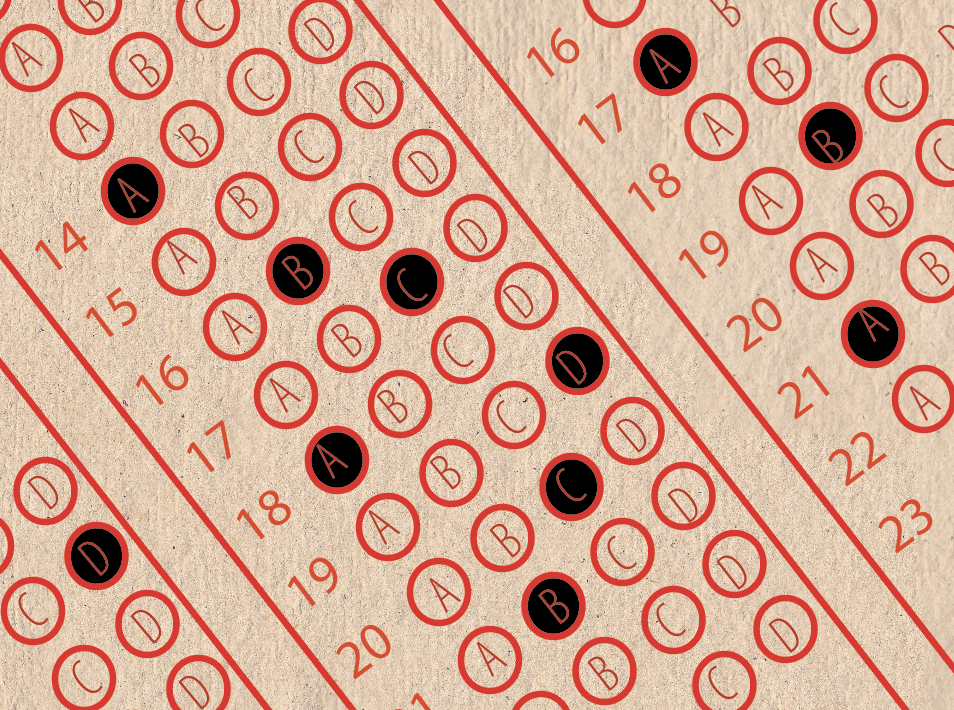NHPS passes policy to support students who opt out of testing
While students have always had the right to opt out of testing, the NHPS’ recent policy hopes to support students who opt out of testing by ensuring there is an alternative curriculum in place, as many continue to argue the downsides of state-mandated testing.

Isaac Yu Illustration.
The New Haven Board of Education approved a policy to support students who opt out of state-mandated testing in New Haven schools.
While opting out of testing has always been an option, the district has never presented a policy to support students and parents who choose to opt out. The Nov. 23 policy ensures that students who choose to do so are respected by the school community in their decision. It also mandates that these students are provided with “appropriate instructional experience” while others are testing. This instructional experience may vary from school to school but should be “related to what they are learning,” according to the policy.
New Haven parent Sarah Miller has opted her children out of state-mandated testing in the past. She said that previously, options for students who opt out of testing during exam hours have varied. While some children are just told to go read a book, her children were able to have special projects per her request.
“I think we all sort of have this hope that we would look at these questions [anew], coming out of COVID-19, and really ask what kind of school system we want to have and does this actually make sense,” Miller told the News. “ That hasn’t happened with real seriousness so far, but I think that this policy is a is a step in that direction.”
Miller said that there are only “a handful of kids” at her children’s school who opt out of testing, but she said she thinks this is due mainly to the fact that the option to opt out has not been publicized to parents.
According to Board of Education Vice President Matt Wilcox, the policy’s main goal is to provide district-wide guidance to address the inconsistency with which district schools treat families who choose to opt their children out of testing.
Wilcox told the News that there are several other situations in which families opt of of educational experiences like health or sex education, in which parents want their child to still have “some sort of educational experience” where they are supervised by an adult and to not “just be in a hallway.”
The type of state-mandated testing in Connecticut that Miller opts her children out of is Smarter Balanced Assessments. According to Miller, New Haven students begin taking the SBA in third grade and testing usually occurs over the course of two weeks.
Wilcox said that the New Haven community has discussed the benefits and drawbacks of testing for many years. New Haven Public Schools advocates hosted a discussion on the use of standardized testing in early 2020, which Wilcox said was well attended.
“I remember having conversations [about testing] when my oldest child was taking them 15 or 20 years ago,” Wilcox said. “I’m familiar with the research that people say can be very problematic, so I think there’s always been people saying this is a problem.”
Miller said that she opts her children out because of the negative impacts of standardized testing on children’s education and its ineffectiveness as an education tool. Miller not only said that there is data supporting that the content of the tests does not reflect best practices in education, but she also said it causes schools to “teach to a test.”
Previous research has pointed out how standardized testing can limit the curriculum of teachers and fails to fairly assess a student’s strengths.
“My kids come home as the test gets closer, they come home with a lot more things that look like test prep,” Miller said. “It’s really boring. It really makes kids hate school. I think that you just have a different, more negative connection to school and learning in general.”
Additionally, Miller said that data points to how standardized testing often favors wealthier students and does not accurately reflect academic potential. Research has previously shown that standardized testing like the SAT favors wealthy students..
David Weinreb, magnet resource teacher at Elm City Montessori School, agreed that state-mandated testing can be harmful to students, especially those whose first language is not English. Coming out of the pandemic, Weinreb wrote that there is even more awareness of mental wellbeing and how testing like SBA might affect it.
“It has been my experience as a former teacher of bilingual newcomers that tests like SBA administered to a growing number of multilingual learners such as undocumented students from Guatemala or refugees from Afghanistan have always been inappropriate, irresponsible and not aligned with the purpose of our work,” Weinreb wrote to the News. “The preparation and implementation of these assessments, in my experience, causes unnecessary harm.”
However, the federal and state governments use standardized testing data to allocate funding to school districts. According to Wilcox, certain participation levels in testing are needed to obtain funding for New Haven schools due to policies like the No Child Left Behind Act that emphasize the importance of testing. Wilcox said that the district relies heavily on state and federal funding, so it would be “a worry” if participation drops too low.
Wilcox added that instead of aiming to increase participation as more and more students opt out, the board or New Haven Public Schools could also work to push back against federal regulations.
Miller advocated for NHPS and the Board of Education to take this avenue, as other states like New Hampshire have successfully done. Miller said that schools should be able to create their own assessments within a framework that allow them to customize the tests better to their individual curriculums.
There are 44 school in the New Haven Public Schools system.
Sarah Cook | sarah.cook@yale.edu







